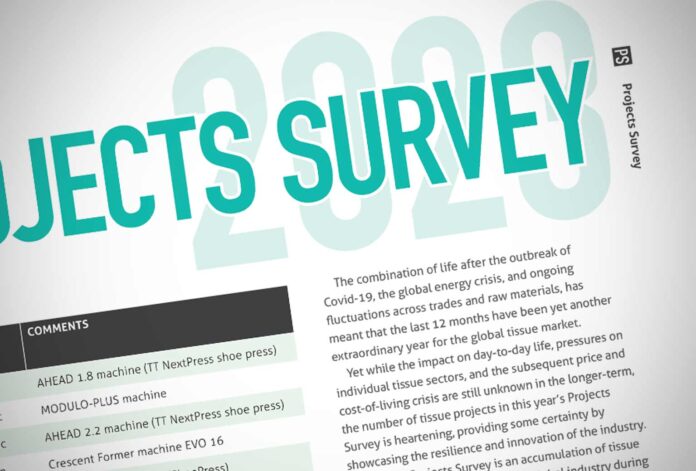The combination of life after the outbreak of Covid-19, the global energy crisis, and ongoing fluctuations across trades and raw materials, has meant that the last 12 months have been yet another extraordinary year for the global tissue market.
Yet while the impact on day-to-day life, pressures on individual tissue sectors, and the subsequent price and cost-of-living crisis are still unknown in the longer-term, the number of tissue projects in this year’s Projects Survey is heartening, providing some certainty by showcasing the resilience and innovation of the industry. The annual Projects Survey is an accumulation of tissue capacity data collected across the global industry during this and previous years by TWM. Significant intel is gained from TWM’s six annual Country Reports which in 2022 included in-depth interviews with tissue mills in Italy, Mexico, Poland and Romania, Thailand, Turkey, and France. Wide ranging news coverage throughout 2022 and into 2023 has also reported on the latest tissue machinery investments from across every continent. In many cases information and investment strategy have come from leading executives themselves.
While the survey represents a detailed snapshot of production strategies in all the major tissue regions, as always caution must be considered with the survey’s findings due in large part to its sheer scope. The figures included here are based on the best information provided, and this has included extensive research into the global tissue industry over the past few years, as well as a reliance on reliable responses from the many companies contacted to detail their present and future developments. With that in mind, this year’s annual Projects Survey notes another healthy figure: 100 tissue projects are listed as being added, ordered or in final planning stages during 2022, 2023, and 2024. This compares to the 157 tissue projects listed during 2021, 2022, and 2023, and the 146 tissue machine projects that were expected to come on stream or had already started-up in 2020, 2021 and 2022. In 2019, the survey noted 101 projects.
As is often the case, many of last years predicted start-ups have been delayed and are now planned for 2023, and some of the ‘new’ capacity announced this year in fact includes some of last year’s estimate. Additionally, and understandably, some companies declined to comment on their projects at this time. There are also a substantial number of confidential projects.
For a better chart readability enlarge the slides (top left button) or open the PDF
Notable points to include
Environmental projects have been accelerated. Increasing in the past 12 months almost more than any other are the number of tissue projects announcing ambitious sustainability targets. One positive, at least, to come from the ongoing energy crisis.
Some 46 projects are in China, again the largest number of start-ups in any country. However, the figure is substantially lower than last year’s survey that expected 80 tissue machines to come on stream. This slowdown could be a result of ongoing overcapacity in the country. It is also important to note there are numerous other small confidential start-ups in China not listed here.
The Brazilian tissue market continues to go from strength-to-strength. While last year’s survey noted just two tissue projects expected to come on stream, this year notes seven, six of which are expected to start production in 2024, and all of which are supplied by Andritz or Hergen.
Across the Middle East, one confidential project is also expected to start up, and Saudi Arabia has three new lines expected to come on stream during 2023 and 2024. Whilst last year Turkey looked robust with six large tissue machines coming on stream in 2021, or expected to in 2022 or 2023, this year just two projects are expected to start-up.
In Indonesia, Asia Pulp & Paper will be starting up three Valmet-supplied lines, whilst India’s Gayatrishakti Tissue is starting up a Toscotec TM in 2024. Across Africa, one confidential tissue machine expected to come on stream in 2023, and Ghana also has one project in the pipeline.
During 2022, there have also been several further price hike announcements made. Effective on 21 March, the Navigator Company applied a 20% energy, logistics and commodities surcharge on the sales price of its tissue products to offset what it said was the significant raising of its input costs. At the time, it said the move was a result of “extreme uncertainty, with Navigator being exposed direct and indirectly to energy price volatility, significantly affecting its profitability”.
In November, Essity implemented “significant price increases,” and said that further increases will also be carried out: “We raised prices for our leading hygiene and health solutions by an average of 14.5% compared to the same period a year ago at the same time as we reported higher volumes in all business areas. Our price increases are offsetting the high-cost inflation with a delay of approximately two quarters,” it said.
With the long-awaited opening-up of the global AfH market seemingly in full bloom, and an unprecedented boost to the At-Home market that seems set to stay, last year’s conclusion that the central theme is “emphatically one of expansion” looks set to stay.
CAUTION
All aggregates taken from the survey should be treated with some caution. While all care has
been taken to publish comprehensive data, it is inevitable that projects will be missing or details incomplete. Many projects have also been delayed, so start-up data used in last year’s Project Survey has had to be repeated. We welcome your help to ensure as comprehensive a survey as possible at the end of 2023.



























